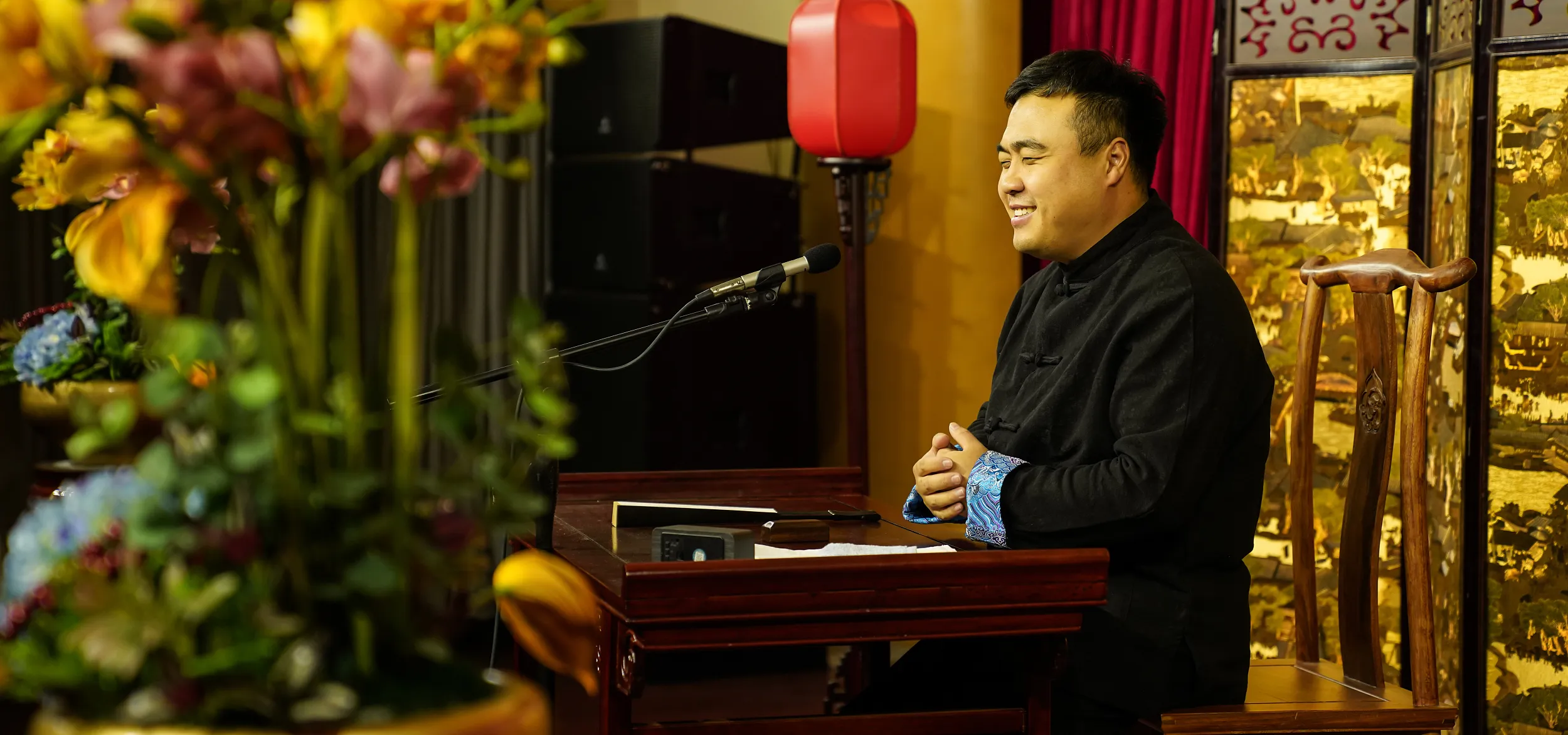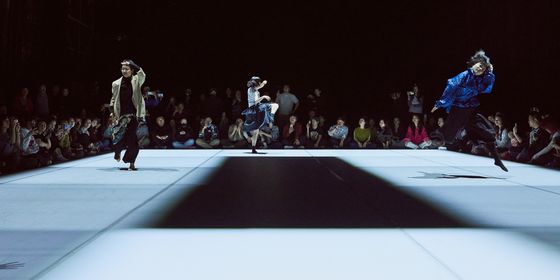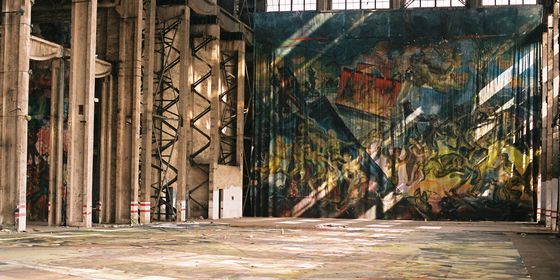China’s oral storytelling tradition lives on in the taxicabs…plus some other favorite programs your driver is probably listening to
Taxi rides can be hellish if you’re not a social butterfly, especially in Beijing where cabbies are famously gregarious and don’t care who they offend. If answering questions about your relationship status, commiserating over house prices, or listening to your driver name-drop various politicians du jour while stopped at a 20-minute left-turn light is not really your thing, it might be quite a relief to come across that other breed of taxi driver who is wholly riveted by radio programs playing at high volume throughout the ride—a blessed, raspy relief.
That’s right: once you’ve ridden with the radio-fanatic taxi driver enough, you may start to recognize certain voices. One in particular is an older-sounding man whose sandpapery tones seem to come from the depths of his acerbic, somewhat excitable soul. This is Shan Tianfang (单田芳), one of China’s pre-eminent artists in an ancient performing arts genre called pingshu (评书), which literally means “commenting on the book” but is usually referred to as “oral storytelling.” Shan, and pingshu generally, is beloved not only by taxi drivers but most of the public before there was much entertainment other than radio—several TWOC staffers claim to have listened religiously as children—but it is becoming somewhat of a lost art in today’s saturated media environment. But paradoxically, it’s gaining more prestige the faster it disappears. (Hear Shan recite Chapter 72 of Romance of the Sui and Tang Dynasties below)
This is actually quite ironic because historically, pingshu was considered the epitome of “folk” art and a cornerstone of northern Chinese, Han-ethnicity culture. The premise is exactly what it sounds like: a person (usually a man, but there are a few women among today’s pingshu masters) recites a well-known epic all by himself, doing all the different voice parts and narrations as well as adding occasional background detail and commentary, traditionally in a teahouse or a stall set up in the marketplace. The tales are generally complex and skew traditionally “masculine” in their subject matter—wars, court cases, heroics, brotherly bonds, and political intrigue, rather than love stories and sentimentality.
Master performers were especially noted for being able to portray multifaceted historical figures in all their bluster and bravery. The epics also tend to be extremely long and can be divided into hundreds of chapters, all of which the pingshu master recites from memory after long years of apprenticeship and training. However, masters didn’t (and don’t) tend to come from elite education backgrounds: the important thing is to be able to make the recitation interesting and to be extremely well-versed in the historical background of the period you’re discussing, definitely making pingshu a craft for the common people.
The original versions of some of China’s classic literary works, notably The Water Margin and Romance of the Three Kingdoms, began as pingshu epics that were later collected and written down. These works then in turn became staples of pingshu genre; one of Shan’s most famous performances is his recitation of The Water Margin, and there’s a good chance that this exact version is what your driver is listening to next time you hear his voice rasping from a cab.
Traditionally, pingshu masters reciting live from a teahouse or marketplace would stand behind a wooden table, armed with only the “three pingshu treasures” (评书三样): a handkerchief, a folding fan, and an “attention-catching wooden block” (醒木). The first two objects can be whipped out to illustrate various actions such as reading or sword-fighting. The “attention-catching block” is struck to signal the beginning of the performance or end of intermission, and can be struck again at climactic moments. In a pinch, the performer can also use their own belongings, such as tea cups or tobacco pipes, as props.
Pingshu came to the radio in the 1950s, and as live performances have all but disappeared as a form of entertainment for the ordinary public, radio (and more recently, online podcasts) is practically pingshu’s only platform today. Thus, stripped of the visuals and props, what distinguishes a master storyteller these days from just a guy who memorized a book is undoubtedly the voice (and some background contribution from the “attention-catching block”). Shan’s is considered to be the epitome in pingshu voices today; the raspy quality makes him sound particularly grandfatherly and “ordinary,” and very gratifying to hear when it comes to describing epic battle scenes or excoriating the follies of historical figures. In fact, the last time he officially took on apprentices back in 2010, he had to issue a warning for them not to try to copy his voice but to “focus more on innovation.” Several other radio pingshu masters, such as Tian Lianyuan, also have somewhat hoarse-sounding voices, possibly just due to the nature of the work.
Why do taxi drivers like them so much, though? It could just be because other than traffic updates and talk radio, pingshu is the only program playing on most stations during the day. However, having the radio tuned to an ancient Chinese art in which great literary works are preformed is also definitely part of the erudite-yet-approachable image that cab drivers, especially older drivers in Beijing, have carefully cultivated: in fact, it’s not so different from knowledgeable-yet-uneducated image of the pingshu masters themselves. In taxi driver lore, the typical Beijing driver is a “second-generation fallen intellectual”—that is, who grew up in a Beijing hutong in a former aristocratic compound later subdivided into several family units, the children of intellectuals who were banished there during various political agitations in the mid-20th century. This is definitely no longer (if ever) true as drivers now come from a variety of backgrounds and often from the suburbs, but the image of the politically savvy, pingshu-loving, literary cabbie remains.
Bonus: What else is your taxi driver listening to?
If you ride a Beijing taxi in the evening, you might also hear a comedy show with a laugh track where the co-hosts put on various regional accents and voices. This is “Happy Forward” (快乐正前方), which airs on Beijing’s traffic channel, FM 103.9, from 9 p.m. to 10:30 p.m. each day. Hosted by Wang Wei and Wen Feng, the program consists of a series of radio skits in the style of a cross-talk: Wen, the “straight man,” asks questions, makes comments, and gives a number of other verbal cues to set up Wang’s punch lines. Wang is noted for doing the Tangshan dialect and is generally popular due to the “magnetism” (磁性) of his voice—in Chinese, this refers to a rich, deep timbre that reverberates nicely against the microphone shield. Thus, he can also be heard giving updates on the FM 103.9 traffic hotline frequently.
FM 103.9 also offers a variety of other programs, such as traffic news, legal advice, and talk shows about relationships. According to the station’s website, the most popular shows (in no particular order) are currently 警法时空, in which legal experts take questions submitted by listeners or on the internet; 激情岁月, which is basically the same thing but for dating advice; various comedy and traffic-related programs plus 百姓TAXI, a talk show about issues of interest to the ordinary taxi driver such as avoiding scams and the challenge of obtaining insurance. There is also, of course, 长书连播 (literally “long book broadcast”), the pingshu program. It’s pretty standard stuff, all things considered, and almost every city has its own channel devoted to traffic.












